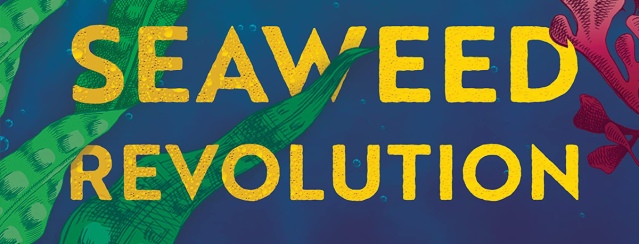
Book review: The Seaweed Revolution, by Vincent Doumeizel

By Jeremy Williams

I was on holiday on the South Coast this summer, and when I’m by the sea I like to read about it. This time I chose Vincent Doumeizel’s The Seaweed Revolution, which is a book I have been anticipating for some time. I expect ocean farming to be one of the big stories of this century, an increasingly obvious opportunity that is scarcely recognised in some parts of the world. Up to now, there hasn’t been a book for a popular audience that explains it, but here it is.
First published in French last year (and translated by Charlotte Coombe), The Seaweed Revolution makes a compelling case for seaweed as “undoubtedly the world’s greatest untapped resource.”
We haven’t embraced seaweed in Western culture – even the name marks it as an inconvenience. And yes, it’s annoying sometimes. The vast seaweed tides in some parts of the world are a genuine environmental hazard, though they are often due to poor farming practices. We tend to encounter seaweed when it’s dead and washed up, so it’s hardly surprising that we don’t understand it.
Ignoring it is our loss. As Doumeizel writes in the introduction, “seaweed could feed people, replace plastic, decarbonize the economy, cool the atmosphere, clean up the oceans, rebuild marine ecosystems and reduce social injustice by providing jobs and income to coastal populations.” The book then goes on to prove all these points, with chapters on seaweed for food, medicine, materials, and for storing carbon.
All of these things are possible and are being done somewhere in the world, and the book is full of eye-opening case studies, facts and innovative businesses. Asia already has ocean farms, including mechanised ones in places such as South Korea, and 97% of seaweed production happens in Asia. Meanwhile, in the West, 99% of our modest seaweed use is foraged by artisanal small businesses. “At sea, we are still Stone Age hunter-gatherers,” says Doumeizel. The agricultural revolution that happened ten thousand years ago on land never had an equivalent at sea, but it could be just as transformative.
If that sounds like an exaggeration, we should remember that seaweed has already influenced the world in some unexpected ways. Algae has shaped evolution and helped to create the earth’s climate. Ancient seaweed dying and sinking to the ocean floor is one of the major sources of fossil fuels. Seaweed was an important food source in early human migration and remains a forgotten culinary tradition in many cultures. More recently, there’s the extraordinary story of a US kelp-farming boom during the First World War, where kelp provided a source of potash for gunpowder. There are contemporary stories of how seaweed has created economic development in Zanzibar, Madagascar, and several other places that have already got on board with ocean farming. We should stop underestimating seaweed.
The Seaweed Revolution has a global perspective, and it’s written with infectious enthusiasm and hands-on expertise. For all the optimism and can-do attitude, the author is aware of potential downsides as well as opportunities. Like anything, ocean farming has to be done well, and Doumeizel is a co-founder of the Safe Seaweed Coalition that is sharing operational and environmental good practice in the emerging industry. With all of that in mind, I think The Seaweed Revolution is one of my favourite books of the year so far.
First published in The Earthbound Report.